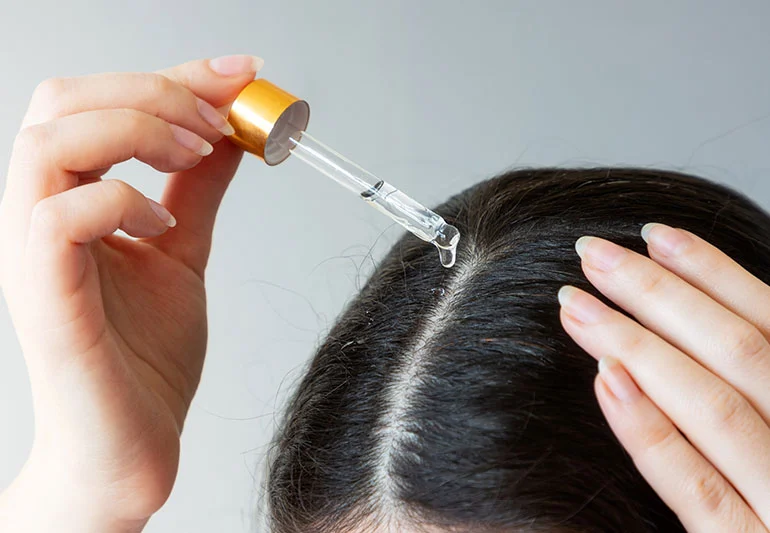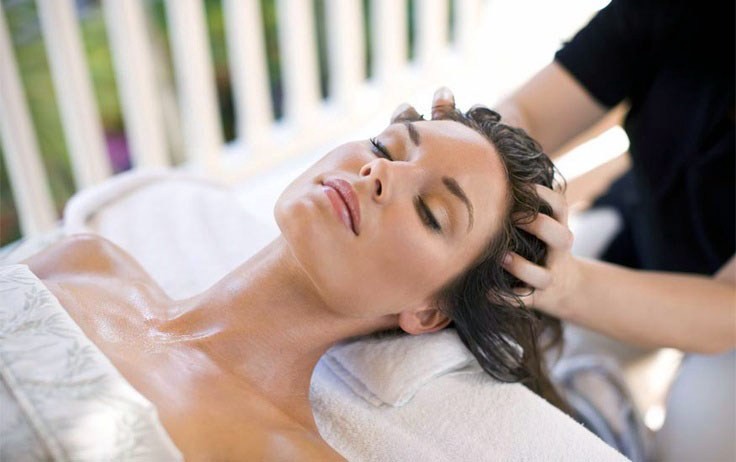Introduction
Is hair oiling good for your hair?
Is hair oiling good or curly hair?
These are just some of the Google searches that have been made about hair oiling. Trust us. We know how hard it can be to have a good hair day. And we know that there have been many discussions both online and IRL that conclude with hair oiling being the best thing ever. However, is hair oiling that great? Is hair oiling good for fine hair? Let’s take a look.
Hair oiling is a simple yet effective practice for centuries to maintain healthy and beautiful hair. Whether you have long locks or short, curly, or straight hair, regularly oiling your hair can work wonders. In this article, we’ll explore why hair oiling suits your hair, focusing on its numerous advantages.
The history of hair oiling
Is hair oiling good or bad? Well, it depends on which culture you come from.
Hair oiling is a cherished practice in many Asian cultures, deeply rooted in ancient traditions and passed down through generations. This age-old ritual involves massaging various natural oils into the hair and scalp for many benefits. While it may seem like a simple beauty regimen, hair oiling has a rich history and continues to be an integral part of Asian grooming routines. In this article, we will delve into the significance and advantages of this venerable practice.
Historical Roots
The tradition of hair oiling in Asia can be traced back thousands of years. It originates in ancient Ayurveda, the traditional system of medicine in India. Ayurvedic texts, dating back 6,000 years, extol the virtues of herbal and plant-based oils for hair care. Over time, this practice spread across the continent. They became a staple in various cultures, including India, China, Japan, and the Middle East.
Choice of Oils
Is hair oiling good for oily hair? Is hair oiling good for an oily scalp?
Asian hair oiling is not a one-size-fits-all practice; it varies depending on hair type, climate, and personal preference. A wide array of oils is used, each offering unique benefits. Common choices include coconut oil, almond oil, sesame oil, and castor oil, all known for their nourishing properties. These oils are often infused with herbs and spices to enhance their therapeutic effects.
The Ritual of Application
The process of hair oiling involves a gentle and deliberate application. First, the chosen oil is warmed to a comfortable temperature, ensuring it effectively penetrates the hair and scalp. Then, the oil is applied evenly, starting from the roots and working down to the tips. A soothing massage accompanies this application, stimulating blood flow to the scalp and promoting relaxation.

Holistic Benefits
The practice of hair oiling in Asia extends beyond mere aesthetics. It is deeply ingrained in holistic well-being. Asian cultures believe that the condition of one’s hair reflects overall health; thus, hair oiling is seen as a way to maintain balance in the body. The oils used are rich in vitamins, minerals, and fatty acids that nourish the hair, support scalp health, and reduce stress.
Hair Health and Growth
One of the primary reasons for the persistence of this tradition is its undeniable effectiveness in promoting hair health and growth. The oils used in hair oiling are packed with nutrients that strengthen hair strands, reduce breakage, and prevent split ends. Massaging the scalp during the process stimulates hair follicles, encouraging faster and thicker hair growth. This is particularly important in Asian cultures, where long, lustrous hair is often considered a symbol of beauty and vitality.
Protection from Environmental Stressors
Asia’s diverse climate conditions, from harsh winters to humid summers, expose hair to various environmental stressors. Hair oiling is a natural shield, protecting the hair from damage caused by pollution, UV rays, and excessive heat. The oil forms a protective barrier, preventing moisture loss and preserving the hair’s natural beauty.
The many advantages of hair oiling

Nourishes the Scalp
One of the key reasons why This is beneficial is its ability to nourish the scalp. A well-nourished scalp is essential for healthy hair growth. When you apply oil to your scalp, it helps moisturize and soothe it, reducing dryness, itchiness, and dandruff. This nourishment promotes a healthier environment for hair follicles to thrive. Now you have the answer to the question, is hair oiling good for dandruff?
Strengthens Hair Strands
Hair oiling helps strengthen the hair strands from the roots to the tips. Oils like coconut, almond, and olive oil are rich in essential nutrients, vitamins, and fatty acids that penetrate the hair shaft, making it more resilient. This reduces hair breakage and split ends, resulting in longer and thicker hair.
Enhances Hair Shine
Oiling your hair can significantly enhance its shine and luster. The natural oils in hair oils create a protective layer over the hair shaft, preventing moisture loss and giving your hair a glossy appearance. Shiny hair not only looks more attractive but also appears healthier.
Improves Hair Texture
Regular oiling can lead to improved hair texture. Soft, silky, and smooth hair is achievable with the right choice of hair oil. Massaging oil into your hair and scalp helps in better blood circulation, promoting better texture and overall hair health.
Reduces Hair Frizz
If you struggle with frizzy hair, oiling can be a game-changer. The oils help tame frizz by providing a protective barrier against humidity and environmental damage. This results in smoother and more manageable hair.
Prevents Hair Damage
Exposure to pollution, heat styling, and chemical treatments can damage your hair. Oiling acts as a shield against these external factors. The oil forms a protective layer that reduces the absorption of harmful substances and minimizes damage, leaving your hair healthier in the long run.
Promotes Hair Growth
One of the most sought-after benefits of hair oiling is its potential to promote hair growth. Oils like castor oil are known for their ability to stimulate hair follicles, leading to faster and thicker hair growth. Massaging the scalp while applying oil further enhances this effect.
Hair oiling: The various oils good for your hair
Choosing the right hair oil is crucial for maintaining healthy and beautiful locks. With myriad options available, it’s essential to understand the qualities that make a hair oil effective. This guide will explore some of the best hair oils and what makes them stand out.
Coconut Oil:
- Benefits: Coconut oil is a versatile and widely celebrated hair oil. It penetrates the hair shaft, nourishing it from within. It’s known for promoting hair growth, reducing protein loss, and preventing moisture loss, making it a top choice for dry, damaged, or curly hair.
- How to Use: Warm the oil and apply it from roots to tips, leaving it on for at least 30 minutes before washing.
Argan Oil:
- Benefits: Argan oil, often called “liquid gold,” is rich in vitamins and fatty acids. It’s excellent for taming frizz, adding shine, and preventing split ends. This oil is particularly beneficial for those with curly or coarse hair.
- How to Use: Apply a few drops to damp hair or use it as a finishing touch to dry hair.
Jojoba Oil:
- Benefits: Jojoba oil closely resembles the natural oils produced by the scalp, making it an excellent choice for those with oily hair. It helps balance oil production, hydrate the hair, and prevent dandruff.
- How to Use: Apply a few drops to the scalp and hair, leaving it on for 20-30 minutes before washing.
Olive Oil:
- Benefits: Olive oil has too many antioxidants and moisturizing properties. It strengthens hair, reduces hair loss, and adds a natural shine. It’s an ideal choice for those with brittle or damaged hair.
- How to Use: Apply warmed olive oil generously to the hair, leave it for an hour or more, and then shampoo as usual.
Castor Oil:
- Benefits: Castor oil, known for its ability to stimulate hair growth. It’s rich in ricinoleic acid, which nourishes the scalp and strengthens hair follicles. It’s beneficial for those struggling with hair thinning or hair loss.
- How to Use: Massage castor oil into the scalp and leave it overnight for best results.
Almond Oil:
- Benefits: Almond oil is lightweight and easily absorbed, making it an excellent choice for all hair types. It adds moisture, reduces hair breakage, and imparts a natural shine.
- How to Use: Apply almond oil from mid-length to the tips and leave it on for 30 minutes before rinsing.
Avocado Oil:
- Benefits: Avocado oil is rich in vitamins A, D, and E, as well as essential fatty acids. It deeply moisturizes and strengthens hair, promotes elasticity, and prevents damage.
- How to Use: Massage avocado oil into your hair and scalp, leave it on for at least 30 minutes, and then shampoo.
In conclusion, choosing hair oil depends on your specific hair type and concerns. These natural oils offer various benefits. From moisturizing and nourishing to promoting growth and shine. Regularly using good hair oils can transform your hair care routine and help you achieve the luscious, healthy hair you desire.
Conclusion

Is hair oiling good for hair?
In conclusion, hair oiling offers numerous benefits for your hair. It
– nourishes the scalp,
– strengthens hair strands,
– enhances shine,
– improves texture,
– reduces frizz,
– prevents damage,
– and promotes growth.
And no, there is no ‘season’ for hair oiling. There have been many searches on Google asking if hair oiling is good in monsoon. Hair should be oiled and taken care of all year round.
By incorporating regular oiling into your hair care routine, you can achieve healthier, shinier, and more beautiful locks. So, don’t wait any longer – start reaping the rewards of oiling your hair today!
Did you enjoy reading about the various forms of strawberry blonde hair? lt us know! In the meantime, read more articles like How To Use 3-Barrel Curling Iron or Can You Bring A Hair Straightener On A Plane Carry-on?